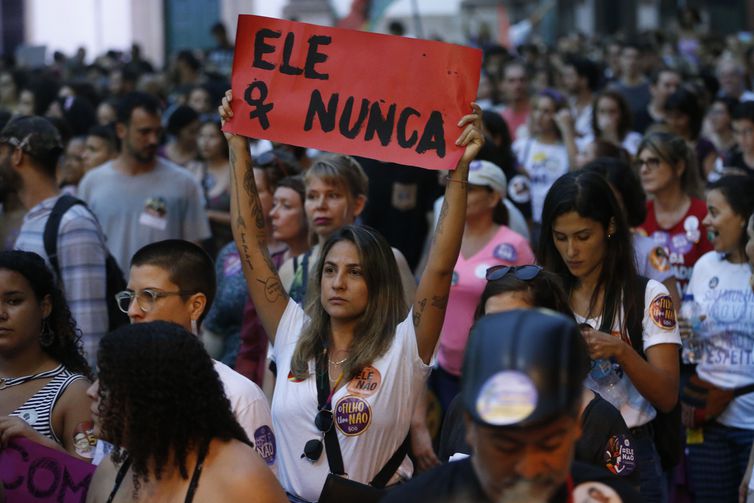Article written by members of LSR, sister organisation of the Socialist Party in Brazil, on the upcoming Presidential elections there, where there is a real risk of far right candidate Jair Bolsonaro being elected.
Following the elections on 7 October, Brazil is in great danger from the point of view of millions of workers, peasants, youth, women, black and indigenous people, LGBT people and all the exploited and oppressed.
The growth of Jair Bolsonaro in the Presidential elections and the election of many of his allies to the national congress and in various state congresses represents a strengthening of the forces of backwardness, authoritarianism, attacks on rights and barbarism.
This is all covered by a mask of “novelty” and “freshness”, and of rejection of the political system and firmness in the face of chaos. It is a total farce!
However, this battle is not over, and we can still win! Liberdade, Socialismo e Revolução (Freedom, Socialism and Revolution – CWI in Brazil), our current in PSOL (the broad left Party of Socialism and Liberty) places itself firmly in the struggle to defeat the far-right, in the ballot box and in the streets.
All possible forces must be mobilised to defeat Jair Bolsonaro in the second round of Presidential elections on 28 October.
This means a vote – a critical vote – for Fernando Haddad, but also the mobilisation of the workers and social movements to win the hearts and minds of the country against the threat of the far right.
This struggle will not end in the second round, but will be decisive in the whole coming period. A firm and coherent stand on this fundamental question will also be key to another fundamental task: the re-building of a mass socialist Left in Brazil.
LSR is taking up its position on these battle fronts.
What does Bolsonaro represent?
Bolsonaro is a defender of the dictatorship and its repression, including systematic torture. He is radically opposed to all advances in the rights of the most oppressed in society, such as women, black people and LGBT people.
His positions consciously stimulate violence against these oppressed people, worsening an already barbaric situation.
Brazil is one of the worst countries for violence against women and LGBT people. There is a genuine genocide of young black people in the periphery of the big cities. Murders of activists, especially indigenous activists defending the environment, are systematic in Brazil. The barbaric murder of Marielle Franco, PSOL councillor in Rio de Janeiro, and Anderson Gomes, showed how this is worsening. With Bolsonaro it is getting even worse.
The social and economic policy which Bolsonaro defends would deeply worsen the situation of the vast majority of the population. Together with his possible future Finance Minister, Paolo Guedes, and Vice President, General Mourao, they defend a radical withdrawal of workers’ rights (such as the “13th month” salary payment) and the total precariousness of work, all in the name of big capital.
They defend radical spending cuts which will deeply affect health and education. This includes privatisation of state institutions and the handing over of national property to foreign capital.
This will mean the deepening of the already hated agenda of Temer, finally approving Temer’s pension counter-reform and complying with the freezing of spending for 20 years which is enshrined in Temer’s 95th amendment to the constitution.
Bolsonaro represents the unity of radical neoliberal policies and proto-fascist practices, the worst possible combination for the vast majority.
However, it was not this programme of brutal attacks which was voted for by most voters. The majority of Brazilians remain opposed to the labour reform, the freezing of spending, privatisations and the pension reform.
A recent Datafolha opinion poll showed that 69% of Brazilians think democracy is the best form of government. Those who said that in certain circumstances a dictatorship is better were 12%.
This authoritarian, ultra-liberal anti-working class programme must be denounced at all times and via all means. The contradiction between what part of the electorate expects and what the far right has to offer must be exposed.
Confusion in consciousness and the lack of alternatives
An important part of Bolsonaro’s vote comes from a social and economic elite which has learned its whole life to hate the poor, black people, women, North-Easterners and LGBT people.
This hate is the result of an extremely unequal social structure inherited from slavery, a patriarchal culture and the process of development of peripheral and dependent Brazilian capitalism. These elite social layers are more open to proto-fascist rhetoric and practices, especially in conditions of crisis of the traditional political establishment, like today (suffice to see the disaster of the PSDB in these elections).
However, the vote given to the far-right also reflects in a terribly deformed way, the indignation and tiredness of a section of the population, lacking in political alternatives and totally disillusioned with the political system and direction of the country.
Brazil has witnessed in recent years one of the worst social and economic crises of its history. This took place in the middle of a political crisis which has led to an institutional coup which put a corrupt clique in power, led by Temer, to directly serve the interests of big capital.
The result of this was more chaos, misery and violence and a collapse of the political establishment in the eyes of the people. Bolsonaro’s growth is in this context.
The political system put in place by the Constitution of 1988 after the dictatorship has been worn out. However, the “alternatives” which have been most visibly presented to people have taken the form of right-wing opposition. Everything else has been seen as the continuity of the political system, including the PT.
The far right was able to jump on this spirit of opposition and add it to a series of prejudices, hatred and reactionary and crude “anti-left” ideas, combined with a hypocritical denunciation of corruption and social conservatism.
Learn from mistakes to beat the far-right
Our most immediate task is to stop Bolsonaro winning the elections. Nothing can get in the way of dedicating all our energy to this task.
However, we must understand that the struggle against the far right will not end don 28 October. It will continue for a whole period and to win a decisive victory we must learn from the mistakes of the PT and the wider Left. This is a pre-condition for the movement overcoming its limits and for victory.
The PT governments did not break with the essence of the neo-liberal policies of their predecessors, but they took advantage of a favourable economic scenario of the commodities boom and favourable conditions for credit which incorporated new sectors of the population into the internal market, and implemented some specific and limited social measures.
There was a period of relief and of hope among the masses. However, no structural economic, social or political transformation was undertaken by any PT government.
In this context, the PT adapted itself to the system and its political methods. Alliances with corrupt right wing parties, like Temer’s PMDB, were part of this process.
With the worsening of the world crisis and the inherent contradictions of Brazilian capitalism, the short cycle of economic boom and political stability ended and cannot return. The illusion in the possibility of a “social pact” from which all classes could win was destroyed. The ruling class broke up this pact and demanded the hardening of neoliberal attacks.
Dilma tried to satisfy the demands of the capitalists in her second term in office with Joaquim Levy as her Finance Minister, via the adoption of harsh austerity measures. This only weakened the government among its social base and opened the way for the institutional coup against Dilma in 2016.
The re-organization of the Left
The struggle which took place in June 2013 gave a clear signal of the crisis of the political and economic system. At the time, the PT was governing the country and together with all establishment parties, clashed with the mass movement which arose in defence of public services and social rights.
This saw the birth and growth of new prominent forces in the struggle such as the MTST (homeless workers’ movement) which saw explosive growth as well as the movement of occupations of secondary schools. This was also seen in the general strike on 28 April 2017. PSOL’s relative growth also reflected this process.
However, this process of re-organisation of the Left was slow and contradictory. Despite these struggles and the growth of Left alternatives, the PT and Lulaism (after former PT President Lula, currently imprisoned) maintained their hegemony in on the “Left” and continued to put forward the idea of permanent class collaborationism and a solution within the established order, the central tenets of Lulaism.
The price paid for this was the defeat of the movement against the coup, and of the struggle against Temer, against the labour reform and the imprisonment of Lula. The PT and the leaders of the trade unions and social movements linked to it have always acted as a brake.
The experience of the terrible Temer government, mass unemployment and worsening living standards, as well as the political persecution of Lula’s imprisonment, helped the PT to recover its prestige among the poorest sections of the population.
The strength and weight of Lulaism has held back the process of re-organisation of the Left, at least from an electoral point of view.
An example of this is the huge contradiction between the enormous sympathy and support won by the campaign of Boulos and Guajajara for PSOL, the MTST and the PCB and other social movements, and the percentage of votes won by the campaign.
The pressure for a “useful vote” ended up derailing a large part of the potential vote for PSOL towards the PT and even towards Ciro Gomes, a bourgeois candidate of the “centre left” but who seemed to many to (incorrectly) be an alternative to the PT.
Despite this the re-organisation of the Left continues. PSOL increased its parliamentary representation on a national level from 6 to 10 MPs and also saw a big growth in state parliaments. The party managed to overcome the recently created legal obstacles to achieving representation (which was not the case for other left organisations) for example. The special success of PSOL’s female, black and LGBT candidates should also be underlined.
The enormous sympathy and support given to the Boulos/Guajajara campaign is also an important gain upon which the process can build in the struggles to come.
However, at this moment, when the right wing is passing through a process of radicalisation and re-organisation, the “Left” is still under the control of the same traditional sectors which have accumulated so much discrediting.
Defeating Bolsonaro is possible
This does not make defeating Bolsonaro in the 2nd round impossible. The reactionary character of his campaign is so deep that we can still defeat him. We must expose this with all the forces at our disposal.
We will vote for Haddad in the 2nd round with full conviction that this is a correct action in these circumstances. However, our vote for Haddad contains no illusions. We will continue to be a Left opposition to any PT government. Definitive victory will only come when we have carried out a radical re-foundation of the Left on a class, anti-capitalist and socialist basis.
Therefore to defeat Bolsonaro, it is crucial that as well as voting, we invest in the organisation and mobilisation of the masses. We must prepare for the struggles that will come, whatever the electoral result.
In this way we will build the foundations for a new radical left alternative to fight to change the system. This is the fundamental task facing the alliance of PSOL, the MTST and PCB as well as other sectors.
LSR makes a call to all workers, women, youth and all the oppressed. This is not the time for desperation or demoralisation, it is time to act!
Let us take to the streets, organise committees of struggle, and action groups. Let us re-conquer lost territory. Let us win the hearts and minds of the people against the far right. And in this process, let us build a new mass socialist Left in Brazil.
• No to Bolsonaro! Our lives matter!
• Vote for Haddad to defeat Bolsonaro!
• Organise the struggle in defence of our rights and against the far right from below!
• Build a socialist and anti-capitalist Left alternative!












